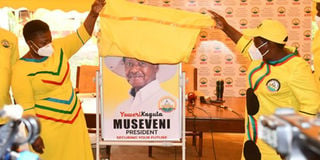Prime
Museveni’s 2021 agenda as he eyes 40-year reign

NRM Secretary General Justine Kasule Lumumba (left) and other party officials unveil the poster of President Museveni at the party headquarters in Kampala on October 27. PHOTO/COURTESY
What you need to know:
- The manifesto is premised on the theme: “Securing Your Future.”
- In the manifesto, Mr Museveni focuses, among others, on industrialisation, establishing parish-based cooperatives, infrastructural development and reducing electricity cost.
President Museveni who seeks nomination today by the National Resistance Movement (NRM) as its sole candidate for the 2021 Presidential elections, has said if he wins the sixth elective term in office, his government will focus on internal wealth distribution and growth of the regional market.
“After his nomination today, President Museveni will launch his 2021 to 2026 election manifesto of the promises he and his National Resistance Movement (NRM) party commit to do for Ugandans in the five years if he is re-elected.
The manifesto is premised on the theme: “Securing Your Future.”
Mr Museveni has described the next term, if he is reelected, as the country’s “take off stage” to modernity.
“Over the years, you have renewed this mandate and enabled NRM to make steady progress in taking Uganda to modernity through job creation and inclusive development. We are now ready for takeoff,” Mr Museveni notes in the foreword section in the manifesto book.
He says with the drastic socio-economic transformation that has been achieved under the NRM through participation in wealth and job creation, it is now time to “integrate into a modern money economy”.
On securing Uganda’s future, Mr Museveni has since his first election in 1996 applied different themes: Tackling the Tasks Ahead (1996-2001); Consolidating the Achievements (2001-2006); Prosperity for All (2006-2011); Better Service Delivery and Job Creation (2011-2016); and, Taking Uganda to Modernity through Job-creation and inclusive development (2016-2021).
In the manifesto, Mr Museveni focuses, among others, on industrialisation through establishment of industrial parks across the country; rural development by establishing parish-based production cooperatives; infrastructural development by reducing the cost of electricity and connecting more villages to the national power grid. He also cites developing the oil and gas sector by producing refined oil and its by-products for the local and export markets.
Many of the “new” promises are as old as 25 years ago. The manifesto repeats some of the old pledges he has offered in each previous election since 1996 but have never been achieved. They include improving quality of education, healthcare and safe water.
Other repeated unfulfilled old promises are fighting corruption, upgrading of Arua, Kasese and Gulu airfields to airport status, and cancellation of land titles in wetlands and gazetted forests.
Justice and Constitutional Affairs minister, Prof Ephraim Kamuntu, who headed the committee that drafted the manifesto, asked Ugandans not to worry about the repeated promises. He said if Mr Museveni is reelected for the next term, government will solve all the unfulfilled pledges he made to Ugandans in the previous manifestos.
“What we have now more than ever before is a paradigm shift in our planning. Before, we were opening out the economy but now we are at the stage of what the dream of NRM has been-- to transform Uganda. We are now at the takeoff stage for economic growth by exploitation of domestic resources,” Prof Kamuntu said yesterday.
The manifesto contains the two-year old recommendation for merger of government agencies and departments to stop duplication of roles and reduce wasteful expenditure.
This recommendation was made about two years ago by a government report but has never been enforced. Prof Kamuntu, however, insisted this time round, the reforms will happen.
“There is a reform programme of harmonising the authorities, commissions and agencies and we are going to do it in the next five years. We are going to work on repealing the laws that establish some of those agencies and authorities that we want to abolish or merge,” he said.
In 2018, Cabinet agreed to only retain Kampala Capital City Authority, Uganda Bureau of Statistics (UBOS), Uganda National Bureau of Standards (UNBS), Uganda Communications Commission (UCC) and National Medical Stores (NMS) but disband, merge or transfer up to 60 other such agencies back to the line ministries.
However, in August last year, government halted the plan in order to rethink the agencies for merger or disbandment.
Some 2021 to 2026 manifesto highlights
Industrialisation
- Develop a well-serviced industrial park in each of the towns of: Arua, Iganga, Bushenyi, Lira, Jinja, Rakai, Gulu, Masaka, Mbale, Soroti, Nakasongola, Mbarara, Moroto, Tororo, Kabale, Hoima, Fort Portal, Luweero-Nakaseke, Buliisa, Kasese, and Mubende.
- Develop our local industrial design in areas of car manufacturing, furniture production, tailoring and all artisanal industries.
- Co-ordinate efforts in industrialising Uganda by ensuring government agencies do not duplicate roles and also consolidate funds meant for industrialisation investments that are scattered across MDAs and utilise them better.
- Support industries that use locally-sourced raw materials to produce most of the goods that we import.
- Promote development of the pharmaceutical industry.
- Rural development and transformation
- Through the parish production cooperatives, educate farmers on post-harvest practices.
- Acquire appropriate technology for post-harvest handling of fish, beef, and dairy and horticulture products.
- Construct 500 private valley tanks and 120 communal valley tanks for livestock watering in Enhance regulation, co-ordination and management of the tourism sector.
- Build a Mahatma Gandhi International Convention Centre in Entebbe to boost country’s capacity to host larger international events.
- Establishment of two regional museums and maintaining the integrity of 100 cultural heritage sites as well as nomination of three sites to the United Nations Educational, Scientific and Cultural Organization (Unesco) world heritage list.
Education, Health and Water
- Improve Early Childhood Development (ECD) through institutionalising training for ECD caregivers at public PTCs and enforcing regulatory and quality assurance system of ECD standards.
- Roll out the Integrated Inspection ICT biometric system in 10,184 public primary schools.
- Construct 258 secondary schools in sub-counties without a public secondary school
- Establish regional sports academies to support early talent identification and development, and the training of requisite human resources for the sports sub-sector.
- Construction of regional cancer centres in Arua, Gulu, Jinja and Mbarara regional referral hospitals.
- Drill 5,000 environmentally friendly and sustainable hand powered boreholes countrywide.
- Install 2,060 environmentally friendly and sustainable solar powered boreholes to increase safe water coverage in the least served villages.
Justice and equity
- Instil zero tolerance to corruption in the judicial system.
- Develop a sector wide integration for information sharing.
- Affirmative Action
- Speeding up the Emyooga and industrial hubs for the youth and different groups including those for women across the country.
- Reaching out to more youth, women, elderly and Persons with Disabilities.
- Continue with SAGE that benefits the elderly and consider lowering the age of beneficiaries from 80 years.
Land
- Cancel land titles that were issued by district land boards on land that was already occupied by customary land tenants. This will include cancelling titles that were given on wetlands.
- Support customary tenants register their land in accordance with the law.
- Clean up the land registry and cancel multiple titles on the same land.
- Environment and Natural Resources Management
- Intensify tree planting on individual farms, commercial farmers, fragile ecosystems such as rivers banks and lake shores, government and non-government institutions, roads reserves, railways and pipelines, etc.




